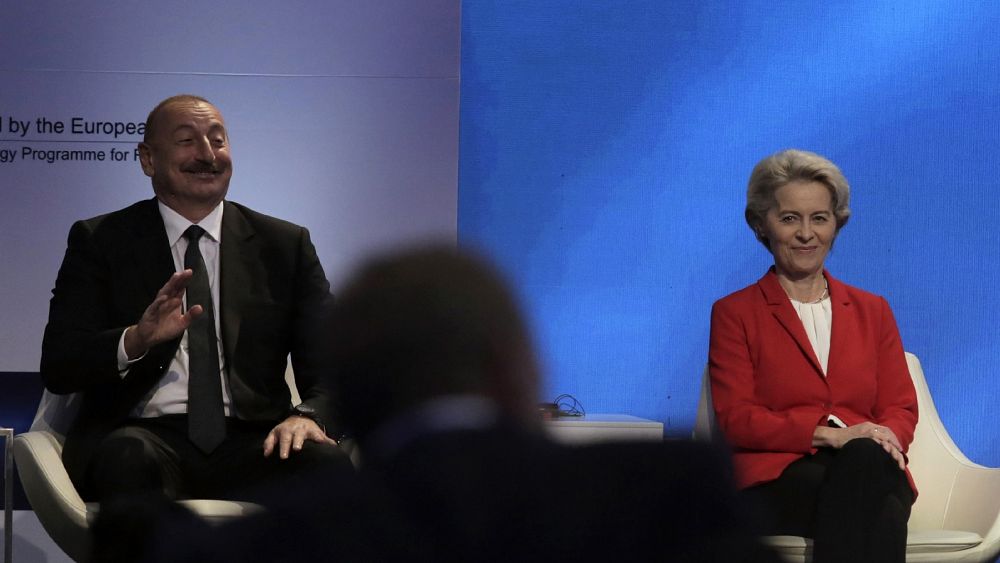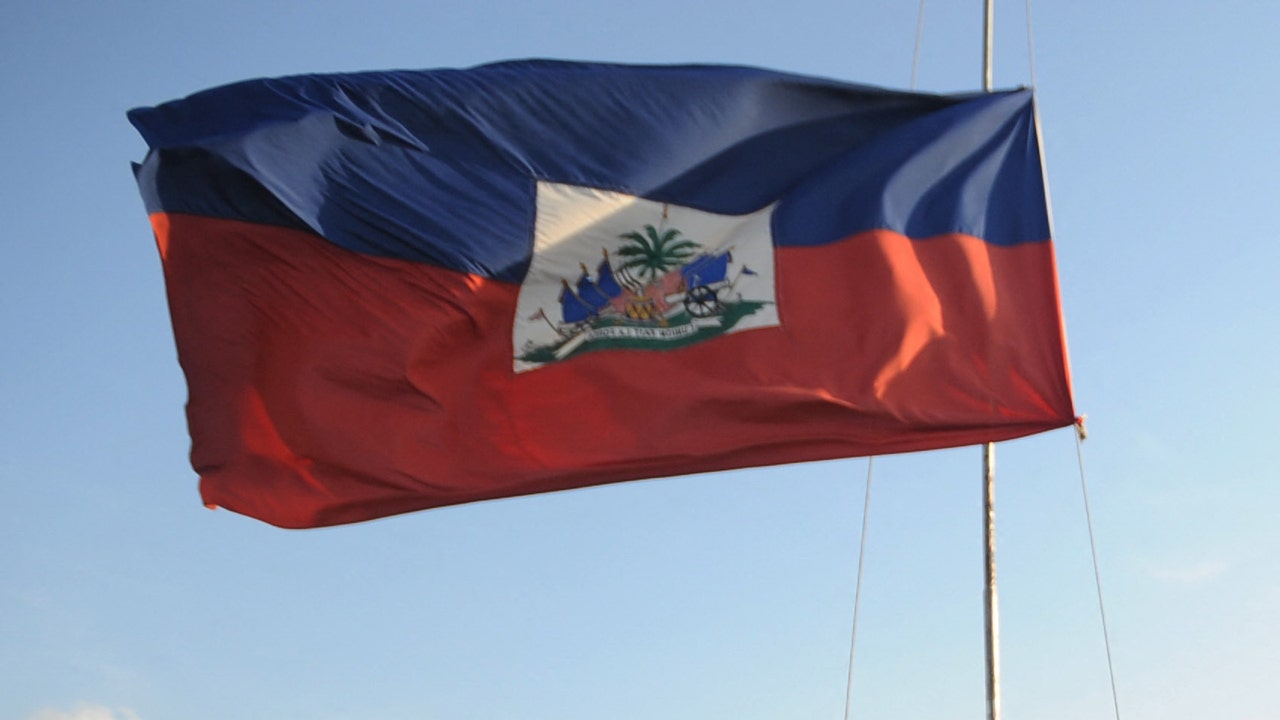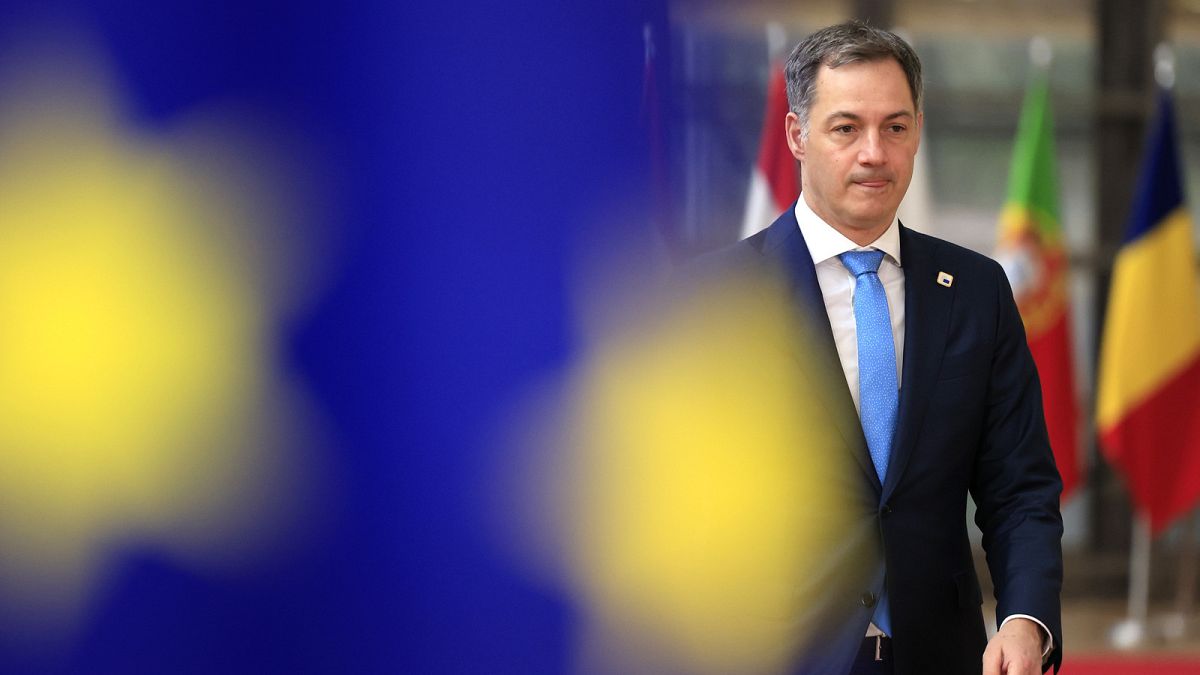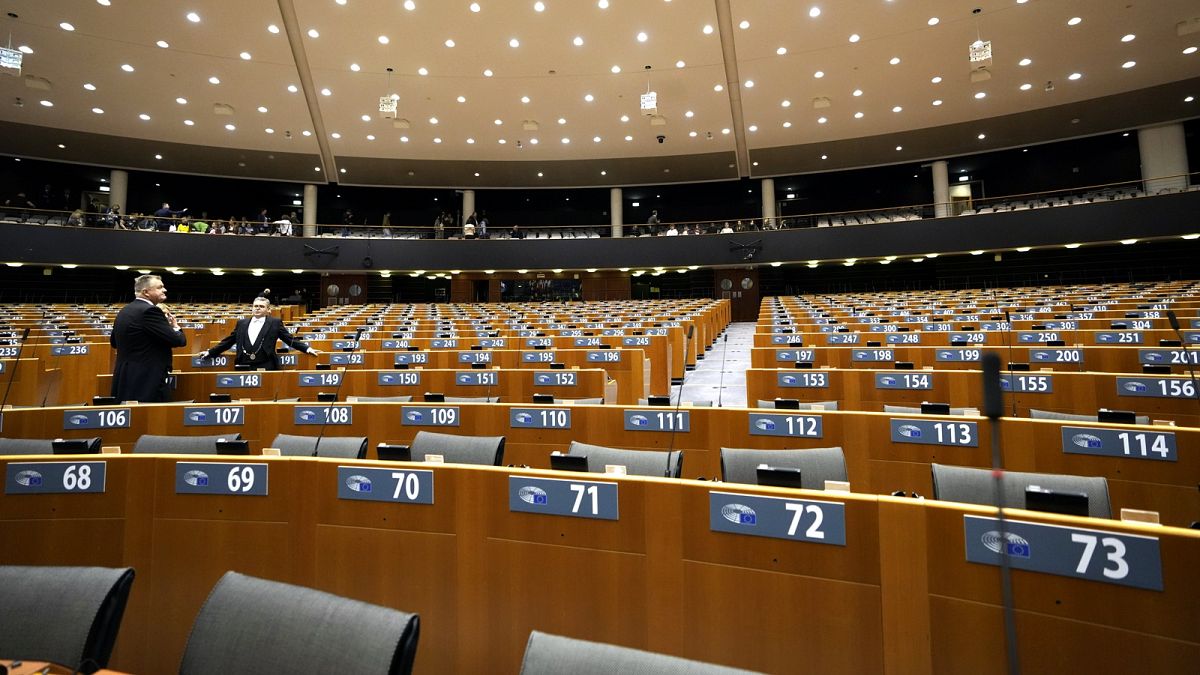World
Nagorno-Karabakh: MEPs call for EU sanctions on Azerbaijan

Members of the European Parliament (MEPs) denounced the EU’s inaction in response to the unfolding Nagorno-Karabakh crisis on Wednesday, calling on the bloc to impose economic sanctions on Azerbaijan.
“The EU should act, impose sanctions, including stopping the imports of gas,” Reinhard Bütikofer, German MEP for the Greens group, told Euronews.
On Tuesday, Baku’s foreign ministry launched an “anti-terrorist” operation in Nagorno-Karabakh, the enclave which is largely governed by its ethnic Armenian population, but recognised internationally as part of Azerbaijan.
The attack follows months of brewing tensions over the breakaway region, awakening fears of a return to the hostilities of the 2020 war where thousands lost their lives.
The EU has condemned the aggression but has not introduced any retaliatory measures. The bloc recently signed a new deal to double EU imports of Azeri gas by 2027, with EU Commission chief Ursula von der Leyen calling Baku a “trustworthy” partner.
EU attempts to de-escalate the decades-old conflict between Armenia and Azerbaijan have also been unsuccessful.
In a debate in the European Parliament on Wednesday, MEPs from all political colours claimed the EU has been slow to react to Armenia’s pleas for aid since Azeri forces blockaded the Lachin corridor nine months ago, preventing essential supplies such as food, medicine and fuel from reaching the ethnic Armenian population.
They also called for economic and trade sanctions as well as the suspension of all bilateral relations with Baku.
The debate came hours before the breakaway region accepted a ceasefire proposed by Russian peacekeepers, who have been present in Nagorno-Karabakh since the Moscow-brokered ceasefire in 2020. But Armenian Prime Minister Nikol Pashinyan has recently turned to the West for backing, expressing frustration at the lack of support from Russia.
“We have been unable to prevent an assault that we saw was coming,” Nathalie Loiseau said.
“Mediation has been a total failure. We have never named the aggressor. We have ignored the Armenian prime minister when he called for our help,” she added.
Loiseau also echoed claims made by Armenia’s Pashinyan that Baku is pursuing its policy of ethnic cleansing. “Our weakness and passivity have made us accomplices of this,” she said.
Baku is no ‘trustworthy’ partner
Parliamentarians were also scathingly critical of the EU’s cosy deals with Azeri Premier Ilham Aliyev.
Von der Leyen called Baku a “trustworthy” energy partner in 2022, as she closed a deal to double EU imports of Azeri gas by 2027 in an effort to reduce reliance on Russian energy products.
EU enlargement czar Olivier Várhelyi also met the Azeri foreign affairs minister in Budapest earlier this month to discuss strategic transport and energy projects.
A spokesperson on behalf of the European Commission said on Wednesday that sanctions could only be imposed by the EU’s member states, but that EU leaders would discuss possible measures during the UN General Assembly in New York.
MEPs claimed the EU’s gas bill from Baku was directly funding Azerbaijan’s aggression and campaign of ethnic cleansing.
EU countries imported €15.6 billion in natural gas from Azerbaijan last year, four times more than in 2021. Bulgaria, Romania, Hungary and Slovakia have also pledged to boost gas imports from the oil-rich country.
MEPs also expressed concerns that gas reaching Europe from Azerbaijan was “de facto Russian gas,” and called for urgent investigations into the origin of gas imported through the southern corridor.
A spokesperson for the Commission rejected that claim, telling reporters on Wednesday that “the gas we are receiving from Azerbaijan is Caspian gas.” Asked how they can be sure that the gas did not originate in Russia, the spokesperson said: “It’s just a question of volumes.”
“From the information that we have, the volume of gas which is exported from Russia to Azerbaijan is very significantly smaller than the gas we are importing from Azerbaijan so it’s simply a case of there is not (enough) Russian gas going in on a scale of what we’re importing into Europe.
Geopolitical interests
MEPs also claimed Russia and Azerbaijan have an interest in installing a puppet regime in Armenia as the Kremlin looks to reinforce its influence in the South Caucasus.
“Russia’s goal is clearly to remove Armenian prime minister Pashinyan,” Raphaël Glucksmann, French MEP for the Socialists and Democrats group, said. “They want to get rid of a democratic government in Armenia, which is chosen in freedom and emancipation.”
“How can you hope for the European Union to assert itself as a geopolitical power if we are prepared to sacrifice such important allies as the Armenians in this way?” he asked.
Correction: The headline was amended to correct a typo with the word “now” changed into “not”.

World
Senate races are roiled by campus protests over the war in Gaza as campaign rhetoric sharpens
HARRISBURG, Pa. (AP) — The student protest movement disrupting university campuses, classes and graduation ceremonies over the war in Gaza is also roiling Senate contests across the nation as Democrats tread cautiously over an internal divide and Republicans play up their rivals’ disagreements.
The political impact of the protests on the White House campaign has drawn considerable attention, with opposition to President Joe Biden’s handling of the Israel-Hamas war reverberating from Columbia to UCLA. The fast-evolving landscape of the demonstrations is shaping pivotal Senate races, too.
Tent encampments have popped up at universities in many states where Democrats this election year are defending seats essential to maintaining the party’s razor-thin Senate majority. At some schools, police crackdowns and arrests have followed.
The protests have sharpened the campaign rhetoric in Pennsylvania, Nevada, Ohio and Michigan, among other places. Republican candidates in California and Florida have stepped up their criticism of the Democratic president for the U.S. response to the war or for chaotic scenes on American campuses.
Some Republicans have shown up at encampments, including one at George Washington University, not far from the White House. Sen. Rick Scott, R-Fla., who is facing reelection, said on social media that he went there to show solidarity with Jewish students. “We need to do all we can to protect them,” he said.
Republican candidate David McCormick, during a visit to the University of Pennsylvania, said protesters at the Ivy League school did not know the “difference between right and wrong, good and evil,” and were creating a hostile atmosphere for Jewish students.
McCormick has decried what he frames as a lack of leadership and moral clarity on the part of his Democratic opponent, Sen. Bob Casey, as well as by Biden and administrators at the school buffeted by accusations of harboring antisemitism.
“What’s happening on campuses is clearly a test of leadership and moral courage, both for the college presidents and for our leaders and for Sen. Casey and President Biden,” McCormick said in an interview.
Israel and its supporters say the protests are antisemitic, a charge that Israel’s critics say is sometimes used to silence legitimate opposition. Although some protesters have been caught on camera making antisemitic remarks or violent threats, protest organizers, some of whom are Jewish, say it is a peaceful movement aimed at trying to save the lives of Palestinians civilians.
Many Democrats, from Biden on down, avoided saying much about the situation until recently as universities began to crack down and comparisons were made to anti-war protests of the 1960s.
Even then, Democrats balanced their criticism of antisemitism and rule-breakers with the need to protect the right to free expression and peaceful protest. Some have tried to avoid taking sides in protests that have pitted pro-Israeli versus pro-Palestinian Democrats and divided important parts of the party’s base, including Jewish, Arab American and younger voters.
Republicans, meanwhile, have railed at what they characterized as equivocating or silence by Democrats. Republicans professed solidarity with Jews against antisemitism while condemning the protests as lawless.
Mike Rogers, a Republican seeking an open Senate seat in Michigan, said student protesters at Columbia were “Hamas sympathizers.” In California, GOP Senate candidate Steve Garvey called them “terrorists” practicing “terrorism disguised as free speech.”
In five states, the National Republican Senatorial Committee, the Senate Republicans’ campaign arm, is using the protests in digital ads about student loan forgiveness, saying Democrats want to pay off the loans of students “radicalized by the far left” who are “threatening Jews,” “attacking police” and “acting like terrorists.”
McCormick and others say universities that, in their view, tolerate antisemitism should lose federal subsidies and that visas should be revoked for any foreign student inciting violence or expressing pro-Hamas sentiments at the encampments.
Casey, long a staunch supporter of Israel, has criticized acts of antisemitism on campuses and pointed to legislation he sponsored as a way to make sure the Education Department takes action.
“Students of course have the right to peacefully protest, but when it crosses the line either into violence or discrimination, then we have an obligation to step in and stop that conduct,” Casey said Thursday as he urged colleagues to pass his bill.
Democratic Sen. Jacky Rosen of Nevada, who is Jewish and facing reelection, said she was “horrified” by displays of antisemitism on campuses and, like Casey, called for the department to hold schools accountable.
In California, U.S. Rep Adam Schiff, the Democratic nominee for an open Senate seat, took aim at the Columbia demonstration and said “antisemitic and hateful rhetoric is being loudly and proudly displayed.” Accused by Garvey of being “incredibly silent” on the protests, Schiff, who is Jewish, voted for a House bill similar to Casey’s and released a statement that condemned violence and the “explicit, repeated targeting and intimidation of Jewish students.”
Republicans elsewhere contended statements by Democrats were equivocating and inadequate.
Republicans called out Sen. Sherrod Brown, D-Ohio, after he told an Axios reporter last week that he was “not going to talk about the politics of that. People always have the right to speak out and should.”
His Republican opponent, Bernie Moreno, charged that Brown had “wholeheartedly endorsed these vile and violent antisemitic demonstrations.”
Later, at a news conference, Brown gave more expansive comments. “Students want to make their voices heard, they need to do it in a way that’s nonviolent, they need to do it in a way that doesn’t spew hatred, and laws need to be enforced,” he said.
In Michigan, which has a relatively significant Muslim population, Biden’s handling of the war is expected to factor heavily into the presidential and Senate races.
Rogers, a favorite for the GOP nomination, thanked New York City police for confronting protesters and “standing up to protect Jewish students at Columbia from the visceral hatred we’ve witnessed from Hamas sympathizers on their campus.”
Republicans argued that U.S. Rep. Elissa Slotkin, the front-runner for the Democratic nominationfor Senate, had not spoken out strongly against protests at Columbia, her alma mater, and that she took five days after they began to say anything at all.
Slotkin, who is Jewish, said in an April 22 statement — the most recent wave of demonstrations began at Columbia on April 17 — that “the use of intimidation, antisemitic signs or slogans, or harassment, is unacceptable.”
It was, she suggested, a complicated topic.
“I would rather be thoughtful and take more time than have a knee-jerk answer for any issue,” Slotkin said in an interview. “But especially this one.”
__
Associated Press reporters Adam Beam in Sacramento, California; Joey Cappalletti in Lansing, Michigan; Mike Catalini in Trenton, New Jersey; Tassanee Vejpongsa in Philadelphia; and Stephany Matat in West Palm Beach, Florida, contributed to this report.
World
13 killed as heavy rains unleash landslide in Haiti

At least 13 people died in northern Haiti following two days of heavy rains, officials said.
The majority of the deaths were caused by a landslide in the southeastern region of the coastal city of Cap-Haitien, according to a Thursday statement by Haiti’s Civil Protection Agency.
GANGS IN HAITI LAUNCH FRESH ATTACKS, DAYS AFTER A NEW PRIME MINISTER IS ANNOUNCED
More than 2,200 homes also were flooded, and there were significant losses in livestock swept away by the Haut-Cap river, authorities said.
Officials say at least 13 people died in northern Haiti following two days of heavy rains. (Photo by THONY BELIZAIRE/AFP via Getty Images)
Crews were clearing roads across northern Haiti, with additional rain expected in upcoming days.
Heavy rains also were reported in neighboring Puerto Rico, forcing at least a dozen flights scheduled to land in the capital of San Juan to reroute to the Dominican Republic and elsewhere, officials said Friday.
Widespread flooding also was reported in the U.S. territory.
World
‘It’s going to be worse’: Brazil braces for more pain amid record flooding

The death toll has climbed to 56 in Brazil’s southern Rio Grande do Sul state, with tens of thousands displaced.
Overpowering floods and mudslides caused by torrential rains are continuing to sweep southern Brazil, killing at least 56 people and forcing tens of thousands out of their homes, the government said.
As well as raising the death toll on Saturday, the country’s civil defence agency said rising water levels in the state of Rio Grande do Sul were straining dams and threatening the metropolis of Porto Alegre.
Triggered by storms that began on Monday, the flooding is only expected to get worse, local authorities said, as rescuers scoured the ruins of washed-out homes, bridges, and roads for missing people.
“Forget everything you’ve seen, it’s going to be much worse in the metropolitan region,” Governor Eduardo Leite said on Friday as the state’s streets were submerged.
‘Nothing could be saved’
The flooding, Brazil’s worst in 80 years, has so far affected at least 265 municipalities in Rio Grande do Sul, according to the southernmost state’s civil defence department.
It has injured at least 74 people, displaced more than 24,000, and left 350,000 with some form of property damage.
“Nothing could be saved,” said Claudio Almiro, who lost his home and possessions to the flooding.
“Many people have even lost their lives. I raise my hand to heaven and thank God that I’m alive.”
Residents in several cities and towns have been left completely cut off from the world, with no electricity or telephone access, while others have been forced to abandon their livestock.
“You don’t know if the water will continue to rise or what will happen to the animals, they may soon drown,” said Raul Metzel, from Capela de Santana, north of the state’s capital.
Five days in, as the rainfall shows no signs of letting up, four of the state’s dams are at risk of collapsing, creating the risk of a new “emergency situation”, according to civil defence officials.
Brazil’s federal government has sent aircraft, boats and more than 600 soldiers to help clear roads, distribute food, water and mattresses, and set up shelters, while local volunteers have also helped with search efforts.

‘Disastrous cocktail’
Climatologist Francisco Eliseu Aquino said the devastating storms were the result of a “disastrous cocktail” of global warming and the El Nino weather phenomenon.
South America’s largest country has recently experienced a string of extreme weather events, including a cyclone in September that killed at least 31 people.
Aquino said the region’s particular geography meant it was often confronted by the effects of tropical and polar air masses colliding – but these events have “intensified due to climate change”.
And when they coincide with El Nino, a periodic warming of the waters in the tropical Pacific, the atmosphere becomes more unstable, he said.
-

 News1 week ago
News1 week agoLarry Webb’s deathbed confession solves 2000 cold case murder of Susan and Natasha Carter, 10, whose remains were found hours after he died
-

 News1 week ago
News1 week agoFirst cargo ship passes through new channel since Baltimore bridge collapse
-

 World1 week ago
World1 week agoHaiti Prime Minister Ariel Henry resigns, transitional council takes power
-

 World1 week ago
World1 week agoSpanish PM Pedro Sanchez suspends public duties to 'reflect'
-

 World1 week ago
World1 week agoUS secretly sent long-range ATACMS weapons to Ukraine
-

 News1 week ago
News1 week agoAmerican Airlines passenger alleges discrimination over use of first-class restroom
-

 Movie Reviews1 week ago
Movie Reviews1 week agoHumane (2024) – Movie Review
-

 Education1 week ago
Education1 week agoVideo: Johnson Condemns Pro-Palestinian Protests at Columbia University


















